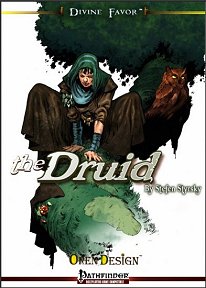
The Introduction begins with an overview of the Druid class - a divine spellcaster drawing on the limitless power of the natural world, and with Wisdom as his primary ability. Special abilities include Wildshape, the ability to change form; whilst druids need to concentrate on the things they are good at with their spells - controlling the natural environment, participating in combat and acting in concert with their animal companion. This page is illustrated with a delightful sketch of a Welsh Archdruid from the 18th century, a time when romantics tried to recreate ancient practices, something that led to the establishment of the Gorsedd and the Eisteddfod, something completely different from Druidism as practiced within a fantasy game!
After some advice on feat selection, the discussion moves on to introduce some new class abilities for druids. This begins by exploring a novel option for Wildshape: namely being able to change into several identical animals or even a whole swarm of critters instead of but a single one. Similarly, druids may choose to have a flock of creatures as companions - rats, crows, bats... - instead of a single individual, numbers and size being restricted on a Hit Dice basis, with various options becoming available as the druid rises in level. They can also grant companions the power of speech, and at high levels empower them to cast spells as well.
Next comes some new Druid archetypes. Moon Druids (not, as one single solitary typo would have, Mood Druids!) embody the cycles inherent in nature, life and death, and transformation; and may favour the full moon or the new one. Phase Druids are also interested in change, but for them it is the continuous flux, the fluidity of nature that is important. Green Wardens care about life, growth and renewal, hating anything that disrupts the natural flow or which mimic it in an artificial manner. They are able to harm undead creatures as a result of this hatred. The Forest Child connects with the deepest, darkest reaches of the woods, being particularly close to fey and others who dwell there... including the very plants themselves, enabling them to take on some of the characteristics of a plant. Elemental Shamans form close bonds with one of the elements: air, earth, fire or water; gaining specific abilities related to the element chosen.
These are followed by some new spell domains that druids may acces. Bird, Hunting, Insect, Transformation, and Tree: each with their own specific powers and appropriate spell lists. Then there are a few new creatures suitable - or so tis claimed - to be animal companions. Electic lizards I can understand, but a brain ooze? Or a fast flytrap? (A Venus flytrap-style plant, in case you are wondering. Can you really see your druid wandering around with a plant pot under one arm?). Finally, some new feats.
This is a nice exploration and enhancement of the Druid class, although not all the options sound as if they would be easy or interesting to play. A Forest Child, for example, would thrive in a group that spent a lot of time in wild primordal forests, but would be at a loss in a city or a desert. Some may work better for NPC druids whose location and part in your plot is served by the option in question. There's certainly scope, and druids tend to be rather neglected amidst the flashier and more exciting spell users. Worth a read if you like playing druids, or run campaigns where wilderness adventures feature.
Return to Divine Favour: The Druid page.
Reviewed: 19 September 2011

